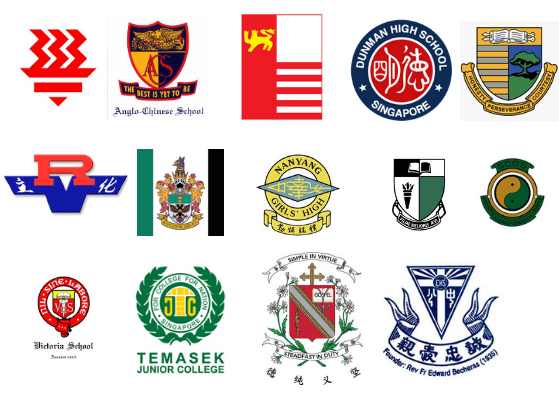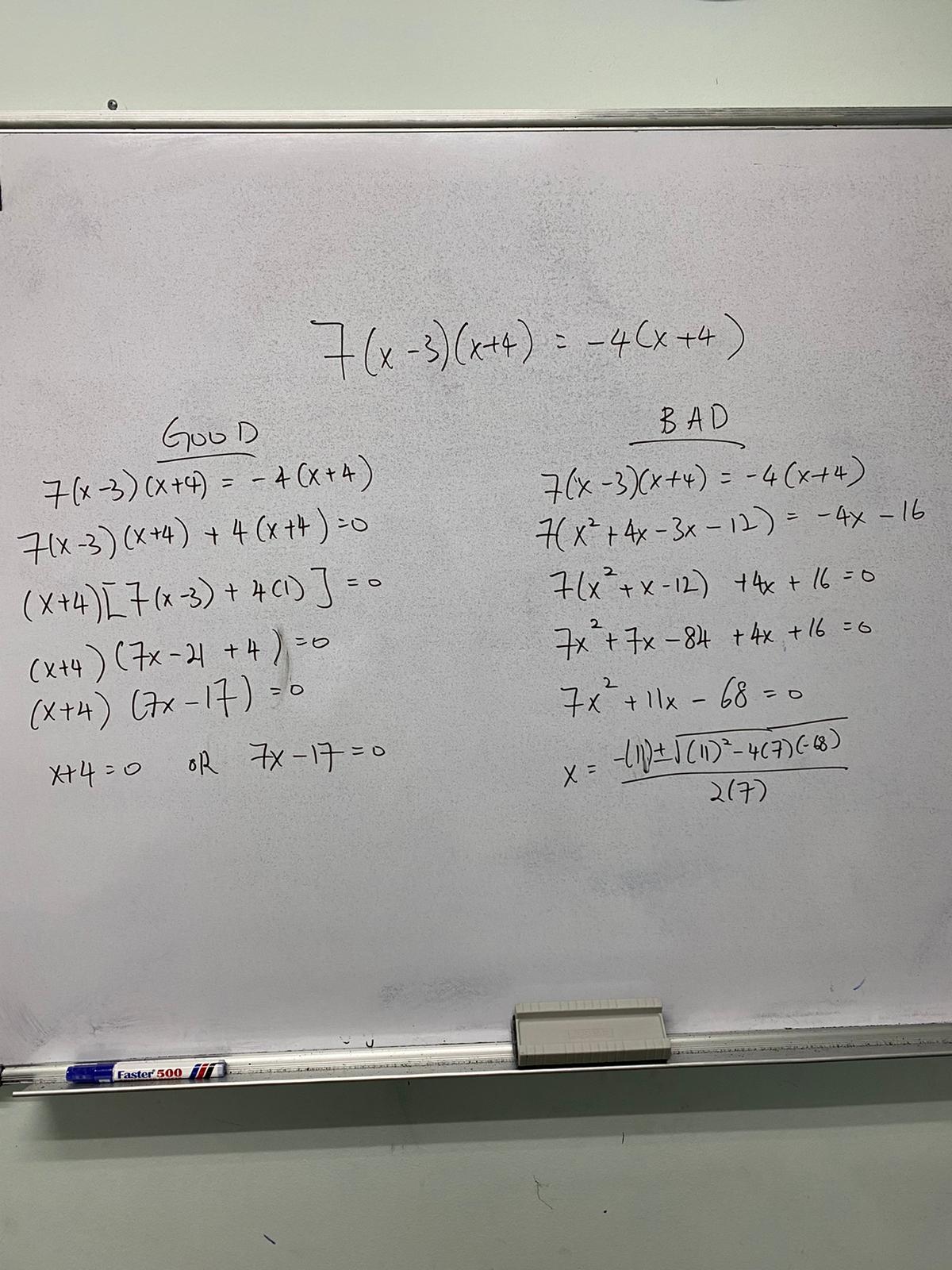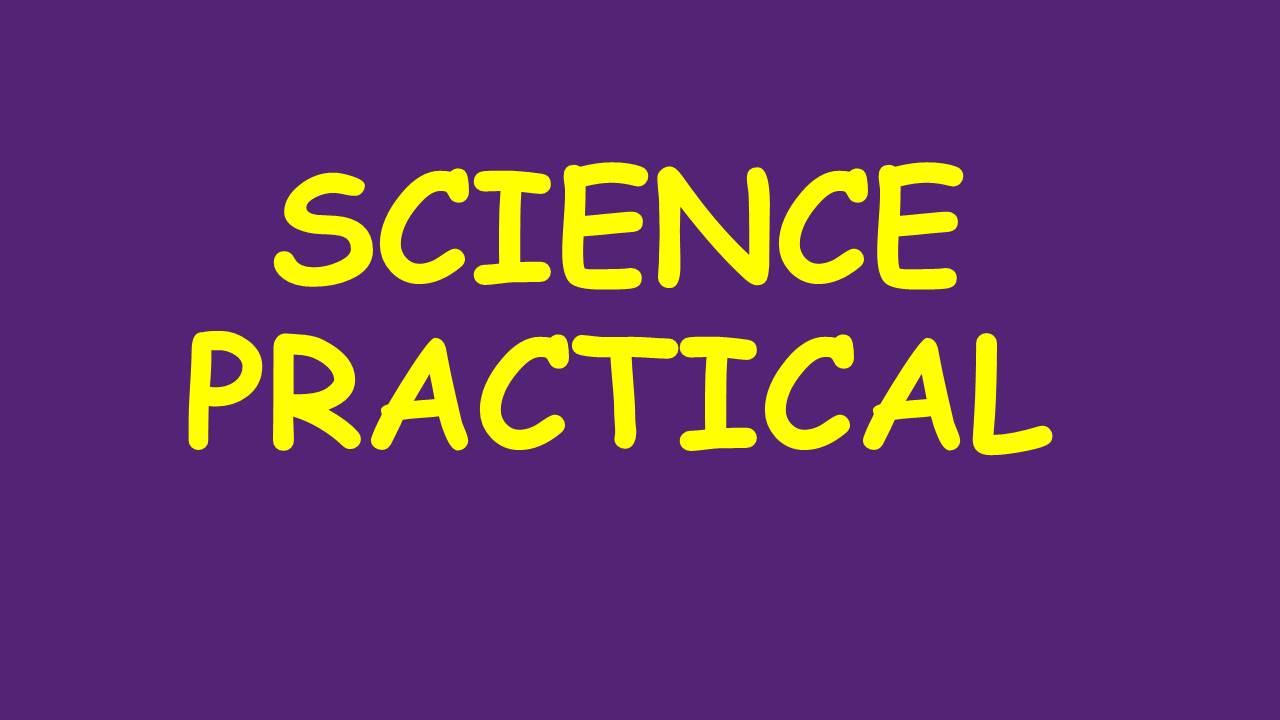
“Algebra’s like sheet music, the important thing isn’t can you read music, it’s can you hear it”
Our training teaches students to grapple with Math intuitively and predictively instead of simply just reading and reacting
Integrated Programme Mathematics Y1-Y4
Y1:
This is a table of comparison for Express and IP Math for Y1. Bolded are the topics unique to IP, which are from the sec3 to sec4 O-level text. Note that this list is not exhaustive.
Y2:
This is a table of comparison for Express and IP Math for Y2. Bolded are the topics unique to IP, which are from the sec3 to sec4 O-level text. Note that this list is not exhaustive.
Y3 to Y4:
This is a table of comparison for Express and IP Math for Y3-Y4. Note that this list is not exhaustive.

How do we address this difference in our classes?
In the IP Math syllabus, efficiency is the key to success. Time and time again, students have complained to me that they have no time to finish the paper, even though they have prepared and are conceptually sound. The reason is that these students are taking very inefficient paths to solving their paper. In IP papers, most questions are set with a critical thinking aspect, meaning, they are testing for your ability to recognize certain patterns, and take the most efficient path, instead of just blindly expanding straight away and working at the math. Take note of important numbers, such as natural squares, cubes, and equations or identities, such as trigonometry identities for tangent, or quadratic identities. Once these patterns are recognized, the path to solving the question will be much smoother, and less prone to careless mistakes. By taking a traditional route and solving it like what you learn exactly from your school lecture or textbook, you are taking an inefficient route, which will delay you, and present your workings in a manner that makes you extremely prone to careless mistakes, due to the unnecessary complexity caused by your haste in solving the question.
The question below is a typical two marks Math question set by Raffles Institution. Note the differences between the recommended approach versus typical approach, appropriately named as good and bad.
NJC JH2 Math:
Solve 7(x-3)(x+4) = -4(x+4)
Common Pitfalls in IP Y1-Y4 Math:
Many students of mine who have done well in PSLE math show an over-reliance on PSLE style, open ended techniques which are designed to solve problem sums, but not secondary level questions. Secondary level questions focus on laws, procedure, equations, and discipline. Insisting on the use of these methods often prove to be detrimental to their grades, as it slows them down significantly, as well as confusing them even further. The nature of the questions at IP level are not as open ended or free-form as Primary school. Students need to memorize specific equations, master specific laws, and apply them in the right context, at the same time also using algebraic manipulation to simplify the question. An A* in math, olympiad maths training, or GEP training will not be enough at the secondary level, especially IP.
Y3-Y4 Maths especially can be a challenge. Unlike the O-level, Y3-Y4 math is packaged as a single subject, but its weightage is equal to two subjects. This gives the students overconfidence, underestimating the workload of the math subject, and dedicating too little time for it until it is too late. Students must remember that IP brings down content from the upper levels, meaning Y1Y2s are tested on certain O-level concepts, and Y3Y4s are tested on certain A-level concepts. Mastery of maths at Y3Y4 also has a DIRECT CORRELATION WITH COMPETENCY IN YOUR SCIENCES. Physics, Chemistry and Biology at the IP level often have their difficulties bolstered by the addition of complex math concepts, be it calculus for rates of changes and graphs, or trigonometry in periodic patterns.
Q: My child is taking double/triple sciences and double math, but has no time to attend all sessions despite needing assistance in all of them. What can I do?
A: Our IP Math classes at the upper secondary level are designed as a hybrid A/E math class, and some of our IP Science classes are designed to be a hybrid Physics/Chem, Chem/Bio, Triple Science class. This is to cater to students who need to receive instructions and assistance in all 3 sciences and both maths but do not have the time and resources to attend so many lessons. Through careful curriculum planning and design by our team of curriculum experts (Master of Education, Curriculum and Teaching, NIE), the lessons are designed to teach the full suite of skills for Maths and Science in a short time frame without being shortchanged, with the addition of around the clock assistance via WA with the tutor for all sciences and maths. Classes run throughout the holidays, and current students have priority placing in booking additional classes during the holidays in order to cover more content.
TOUGH IP MATHS QUESTION SERIES:
Y1 Number Patterns question
Y2 Indices and Index Notation question
Y3 Indices and Surds question
Y3 Simultaneous Equation question
Y4 Binomial theorem question
We aim to consistently update our teaching methods and classroom management style to best suit the teaching of IP syllabus. In order to cater to the Y3Y4 upper secondary students with tight schedules, we offer a dual track Math system for Amath/Emath or Math1/Math2 in the same slot. Contact the tutor to be allocated into the timeslot suitable for you.
IP TUITION SCHEDULE (2025):
IP Y1 Math: Mon and Fri 745pm-915pm, Sun 230-4pm
IP Y2 Math: Mon 5-630pm, Fri 745pm-915pm, Sun 230-4pm
IP Y3 Math: Thu 3-430pm, Sat 230-4pm, Sun 1245-215pm
IP Y4 Math: Mon and Fri 745pm-915pm, Sun 230-4pm
Tel: +(65) 6569 4897 (office).
To sign up, whatsapp 88765498 (Admin).
Fee Structure:
Y1-Y6 SUBJECTS: $360 PER MONTH (4 LESSONS)
(NEW AND AMMENDED)Trial Class:
Costs of a one-off trial class for Y1-Y6 is $120. Trial class timings will be arranged based on my discretion and assessment of your child’s needs. Subsequently, should you decide to sign up, the remainder of the monthly fee will be charged, i.e. you sign up for Y3 in Jan, trial is $120, if after the trial you continue, pay the balance of $360-$120=$240.
A trial class serves as a diagnostics for your child, by looking into his/her previous schoolwork, exam papers, as well as watching how they respond to the lecture and tutorial content. From there, as a parent, you can decide whether the class is suitable for your child. A lot of preparation work is done before a trial, so do make payment ASAP to confirm your attendance.
MISC CHARGES: $30 ONE TIME OFF REGISTRATION FEE AND YEARLY MATERIAL FEE OF $80
STUDENTS WHO JOIN IN THE MIDDLE OF THE MONTH, FIRST MONTLHY FEE WILL BE PRO RATED BASED ON NUMBER OF LESSONS LEFT IN THE MONTH, FOR EXAMPLE IF YOU JOIN IN JUNE WITH 2 LESSONS LEFT FOR Y4 CLASS, YOUR MONTHLY FEE WILL BE 360/4 X 2 = 180, MISC FEES STILL APPLY
NOTE: MATERIAL FEE IS CHARGED FOR ONLINE CLASSES, MATERIALS WILL BE EMAILED TO YOU BY SCANNED PDF, PARENTS CAN ARRANGE TO SELF COLLECT THE PHYSICAL MATERIALS IF NEEDED
NOTE: ONLINE CLASSES ARE SAME PRICING AS PHYSICAL CLASSES, WE PROVIDE THE SAME QUALITY EDUCATION IN SMALL SIZED CLASSROOMS BE IT ONLINE OR PHYSICAL
For more information, visit us at our main IP page:



